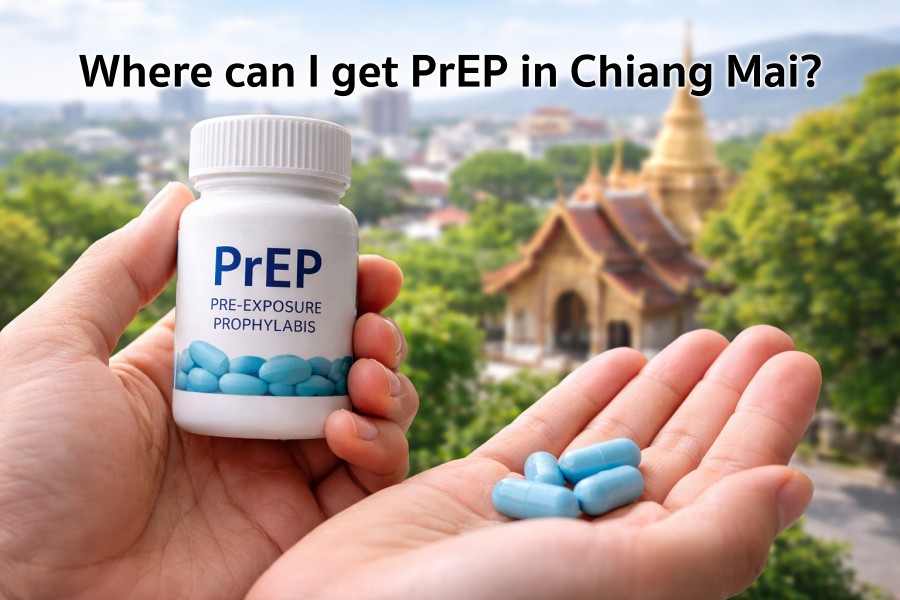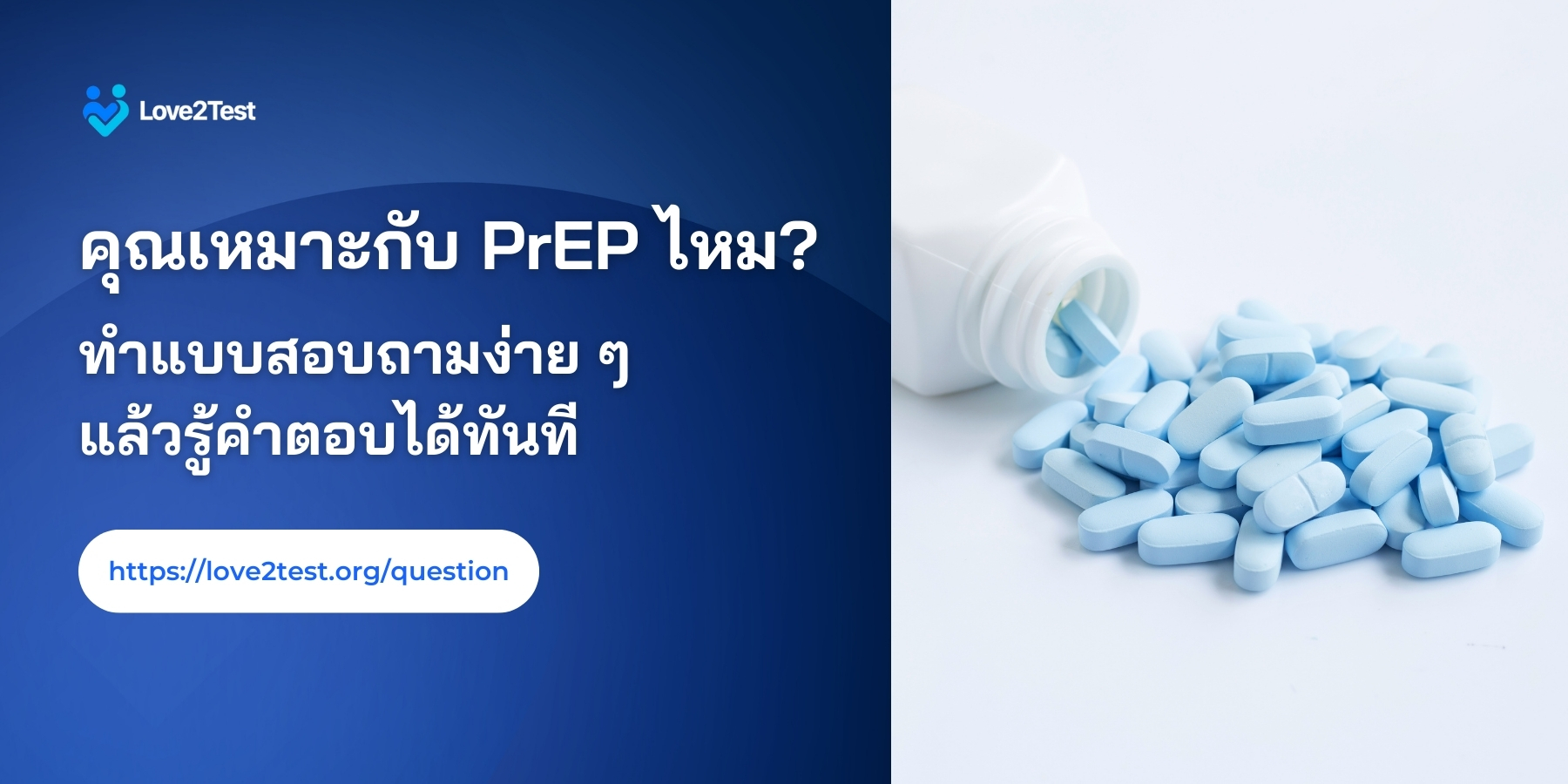In the present, Chiang Mai has become an intriguing destination for business conferences and tourism. Awareness and healthcare are thus important considerations for both tourists and locals. Therefore, understanding about PrEP (Pre-Exposure Prophylaxis) services, which can reduce the risk of HIV infection by up to 90% when used as prescribed by a doctor, is crucial for building confidence and safety in traveling and living in Chiang Mai.
Currently, there are several organizations and hospitals in Chiang Mai that provide PrEP services, such as Maharaj Nakorn Chiang Mai Hospital, Nakornping Hospital, and clinics at the Provincial Public Health Office. Additionally, there are some non-governmental organizations working in the field of rights and sexual health. Accessing these services can be done by contacting these organizations directly to consult with a doctor regarding the correct and effective use of the medication.
What is PrEP?
PrEP, or Pre-Exposure Prophylaxis, is the use of antiviral medication before exposure to HIV to prevent infection in individuals at high risk. It involves taking medication to prevent infection, not to treat the disease.
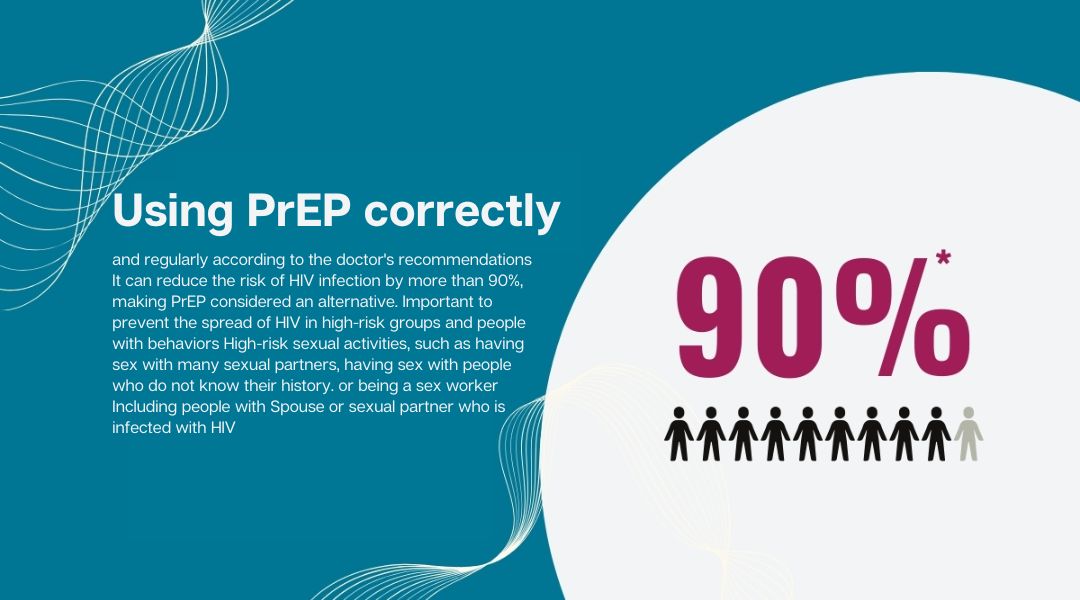
Using PrEP correctly and consistently according to medical advice can reduce the risk of HIV infection by approximately 90%, making PrEP an important measure in preventing the spread of HIV among at-risk groups. These groups include individuals engaging in high-risk sexual behaviors, such as having multiple sexual partners, having sex with partners of unknown HIV status, or being sex workers, as well as individuals with HIV-positive partners or sleeping partners.
How does PrEP help reduce the risk of HIV infection?
PrEP (Pre-Exposure Prophylaxis), or medication taken before HIV exposure, is used to reduce the risk of HIV infection. PrEP works by interfering with the replication of the HIV virus in the body. When taken regularly, the medication binds to certain immune cells in the blood and genital tissues, which are cells that the HIV virus typically uses to infect the body.
If there is exposure to HIV while using PrEP, the medication helps prevent the virus from entering cells and replicating. However, PrEP is not a cure. It only helps prevent HIV infection when taken regularly as prescribed by a doctor. PrEP is highly effective in preventing HIV infection. Studies have shown that daily PrEP use can reduce the risk of HIV infection by more than 90%. However, PrEP does not prevent other sexually transmitted infections. Therefore, using condoms in addition to PrEP is the best way to prevent both HIV and other sexually transmitted infections.
These are some precautions to be aware of regarding PrEP:
- PrEP is not a treatment for HIV. If you think you may have been exposed to HIV, you should get tested for HIV immediately.
- PrEP may have some side effects. The most common side effects include nausea, stomach pain, and headaches. These side effects are usually mild and go away on their own within a few days.
- PrEP needs to be obtained from a doctor. A doctor can talk to you about the risks and benefits of PrEP and assess whether PrEP is suitable for you or not.
Who should take PrEP?
PrEP (Pre-Exposure Prophylaxis) is a preventive medication for individuals at high risk of HIV infection. Let’s take a closer look at who should consider taking PrEP:
People with multiple sexual partners or frequent partner changes
- If you have multiple sexual partners or frequently change partners and do not know their HIV status, PrEP can provide an additional layer of protection against HIV infection.
Individuals engaging in high-risk behaviors
- This includes individuals engaging in behaviors that increase the risk of HIV infection, such as unprotected sex, injection drug use, or needle sharing. PrEP can help reduce the risk of HIV infection in these situations.
Serodiscordant couples
- In some cases, one partner may be HIV positive while the other is HIV negative. In such serodiscordant relationships, the HIV-negative partner can use PrEP to prevent HIV transmission.
Individuals with a history of regular PEP use
- If you have a history of regularly using post-exposure prophylaxis (PEP), which is emergency antiretroviral medication taken within 72 hours after potential exposure to HIV, and cannot consistently reduce risky behaviors, continuous PrEP use can greatly reduce the risk of HIV infection.
Talking to a doctor about your specific situation is important to consider whether PrEP is suitable for you. The doctor can assess your risk factors, discuss any concerns or questions you may have, and provide effective guidance on how to use PrEP. Additionally, regular follow-up appointments with the doctor are important to monitor your health, check the effectiveness of PrEP, and address any side effects or concerns that may arise.
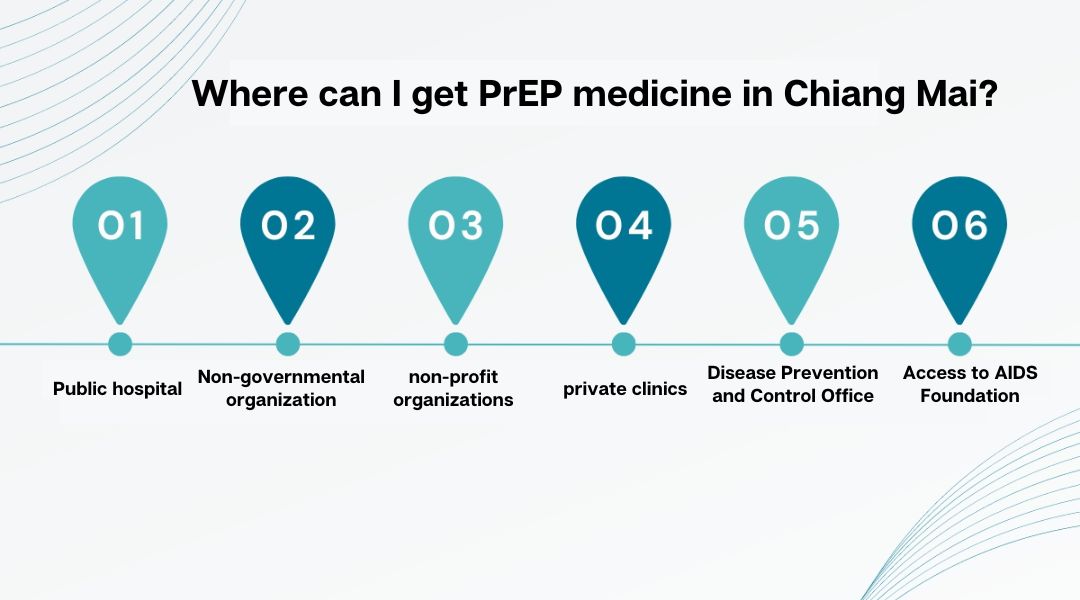
Where can I get PrEP medicine in Chiang Mai?
You can obtain PrEP medication at various organizations and healthcare facilities in Chiang Mai, including:
- Maharaj Nakorn Chiang Mai Hospital, where services are available at the AIDS and STI Clinic.
- Nakornping Hospital, where services are provided at the Special AIDS and STI Clinic.
- Chiang Mai Provincial Public Health Office No. 1, which offers PrEP services at its STI Clinic.
- Some non-profit organizations working in sexual health, such as the Chiang Mai AIDS Support Office (urban area) and the Women’s Health Understanding Foundation (rural areas).
- Non-profit organizations, which can be booked through https://www.love2test.org/clinics.
- Private clinics like Hugsa Medical Clinic in Klang Wiang, accessible at https://cmmedicalclinic.com
Those interested can contact these organizations directly for details on accessing PrEP services, such as appointments, costs, consulting physicians, etc. Obtaining accurate and up-to-date information and accessing PrEP services correctly and safely can help reduce the risk of HIV infection, which is crucial for the health care of both tourists and locals in Chiang Mai, especially for at-risk groups.
How much does PrEP cost?
The price of PrEP (Pre-Exposure Prophylaxis) medication in Thailand depends on the service provider, as follows:
- State hospitals, such as Maharaj Nakorn Chiang Mai Hospital and Nakornping Hospital, may provide the medication for free.
- Private clinics typically charge approximately 500-800 baht per month for PrEP, depending on the brand and facility.
- Some non-profit organizations, like the Chiang Mai AIDS Support Office, may offer PrEP at reduced prices or distribute it for free to targeted groups and disadvantaged individuals.
- Additionally, there is the “Wisdom for the People” program by the Access to AIDS Foundation, in collaboration with the Ministry of Public Health, which provides PrEP to at-risk groups at a cost of only 1 baht.
Generally, if you have full health insurance coverage, you can receive services at state hospitals at no cost. However, for convenience and faster service, you may need to seek care at private healthcare facilities, which may have higher costs. Therefore, it’s advisable to inquire about the details from the healthcare facility or organization of interest before receiving services to plan expenses accordingly.
How to take PrEP
There are two main ways to take PrEP
On-Demand PrEP
On-Demand or Event-Driven PrEP is taking the medication when there is a risk of HIV infection. The process involves:
- Taking the medication approximately 2-24 hours before the activity.
- Taking another dose within 24 hours after the activity.
- Taking another dose approximately 24 hours after the second dose.
- If there is another risky activity, start counting 1-2 pills before the new activity.
PrEP Daily
Daily dosing is taking PrEP every day consistently, whether or not there is a risky activity, to maintain a level of medication in the body that can prevent infection at all times. The choice of dosing method depends on the level of risk behavior, adherence to medication, and medical advice. Typically, daily dosing is more recommended due to its convenience and higher effectiveness in prevention. The steps for daily dosing PrEP are:
- Consult a healthcare provider to get the prescription: Discuss with a doctor or nurse to get a prescription for PrEP.
- Take the medication daily: Take one PrEP pill every day at the same time.
- Take with or without food: PrEP can be taken before, during, or after meals.
- Schedule follow-up appointments: Schedule appointments with a doctor or nurse for check-ups every 3 months.
- Use with other prevention methods: For maximum effectiveness, use PrEP alongside condom use.
- Stay updated: Ask your healthcare provider about updated guidance on PrEP usage.
- Ensure an adequate supply of medication: Prepare enough medication to avoid running out.
- Report side effects: Inform your doctor or nurse if you experience any unusual symptoms after taking the medication.
Possible side effects of PrEP may include headaches, nausea, loss of appetite, or mild skin rash.
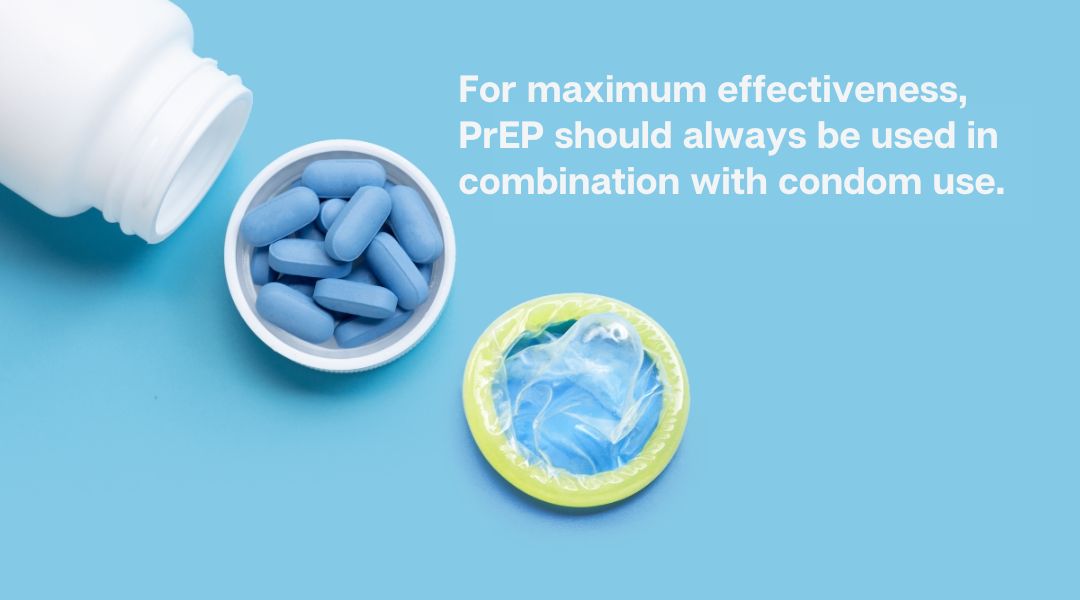
Related Article
The importance of PrEP (Pre-Exposure Prophylaxis) in HIV prevention cannot be overstated. With its effectiveness in reducing the risk of HIV infection by up to 90% when taken as directed by a healthcare provider, PrEP plays a crucial role in promoting confidence and safety in both travel and daily life, especially in tourist destinations like Chiang Mai. This attracts both tourists and locals, benefiting both businesses and relaxation.
Understanding PrEP, including accurate information about its safety and effectiveness, is crucial in creating an environment full of awareness and understanding. This promotes genuine HIV prevention efforts and benefits public health overall. By embracing PrEP and its potential, each individual can take significant steps in protecting themselves and their community from the spread of HIV.
